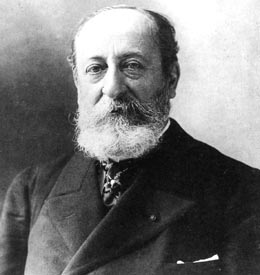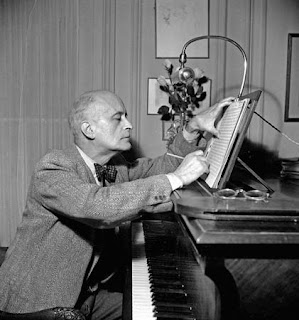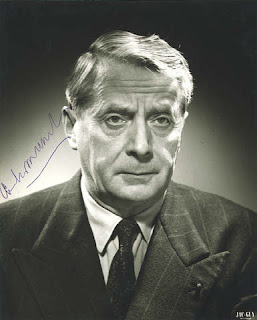Information
Composer: Camille Saint-Saëns; Claude Debussy; Jacques Ibert
- (01) Saint-Saëns - Symphony No. 3 in C minor "Organ", Op. 78
- (05) Debussy - La Mer, L. 109
- (08) Ibert - Escales
Boston Symphony Orchestra
Charles Münch, conductor
Date: 1956 (5-10), 1959 (1-4)
Label: RCA
-------------------------------------------------------------------
Review
Reference Recording: Classic Munch–Saint-Saëns’ Organ Symphony
Still the greatest recording of the Organ Symphony ever made, this latest remastering sounds even grander than the previous Living Stereo incarnation, with a more present and bass-rich organ making a positively cataclysmic experience out of the finale (sound sample attached). Fun as the loud bits are, to be honest it’s the sweetness of the strings in the slow movement, and the amazing way Munch gets the orchestra to really dig into the agitated rhythm of the first movement’s main theme, that together set the seal on this interpretation. He gives the theoretically cooly “classical” Saint-Saëns a remarkable range of expressive depth.
Still the greatest recording of the Organ Symphony ever made, this latest remastering sounds even grander than the previous Living Stereo incarnation, with a more present and bass-rich organ making a positively cataclysmic experience out of the finale (sound sample attached). Fun as the loud bits are, to be honest it’s the sweetness of the strings in the slow movement, and the amazing way Munch gets the orchestra to really dig into the agitated rhythm of the first movement’s main theme, that together set the seal on this interpretation. He gives the theoretically cooly “classical” Saint-Saëns a remarkable range of expressive depth.
I have to say, though, that I greatly prefer the two-track stereo mix to the three-track SACD, which strikes me as collapsing too much of the sound-stage into the center channel (with excessive focus on the organ, resulting in a jolting change of perspective whenever it suddenly cuts out).
Neither the Debussy nor the Ibert were as brightly recorded, but the same general observations apply to this remastering. Munch’s Debussy seldom has impressed me as much as his Ravel, well regarded though it is, and I find this La Mer a bit on the hum-drum side, with surprisingly ineffective climaxes at the ends of the outer movements (where is the tam-tam when you need it?). The Ibert, on the other hand, is as colorful and festive as anyone could want. Does anyone even play this piece anymore? What a pity, as it’s great fun. So, although this is a bit of a mixed bag, it has the best Organ Symphony ever, and that’s well worth the cost of admission.
-- David Hurwitz, ClassicsToday
More reviews:
-------------------------------------------------------------------
Camille Saint-Saëns (9 October 1835 – 16 December 1921) was a French composer, organist, conductor and pianist. Saint-Saëns was a musical prodigy, making his concert debut at the age of ten. He was a successful freelance pianist and composer, in demand in Europe and the Americas. His best-known works include his concertos, his 3rd symphony, Danse macabre and The Carnival of the Animals. Saint-Saëns was enthusiastic for the most modern music of the day, although his own compositions were generally within a conventional classical tradition. Saint-Saëns' students included Gabriel Fauré.
***
Claude Debussy (22 August 1862 – 25 March 1918) was a French composer. Along with Maurice Ravel, he was one of the most prominent figures associated with Impressionist music, though he disliked the term when applied to his compositions. Debussy is widely regarded as one of the most influential composers of the 20th century. His innovative harmonies and his use of non-traditional scales were influential to almost every major composer of the 20th century and also some modern music groups. Debussy's music is noted for its sensory content and frequent usage of nontraditional tonalities.
http://en.wikipedia.org/wiki/Claude_Debussy
http://en.wikipedia.org/wiki/Claude_Debussy
***
Jacques Ibert (15 August 1890 – 5 February 1962) was a French composer. Ibert studied at the Paris Conservatoire and won its top prize, the Prix de Rome, at his first attempt, despite studies interrupted by his service in World War I. Ibert pursued a successful composing career, writing seven operas, five ballets, incidental music for plays and films, songs, choral works, and chamber music. He is probably best remembered for his orchestral works including Divertissement (1930) and Escales (1922). Ibert did not attach himself to any of the prevalent genres of music of his time, and has been described as an eclectic.
Charles Munch (26 September 1891 – 6 November 1968) was an Alsacian symphonic conductor and violinist. He studied with Carl Flesch in Berlin and Lucien Capet at the Conservatoire de Paris, and served as concertmaster of the Leipzig Gewandhausorchester under Wilhelm Furtwängler and Bruno Walter. Noted for his mastery of the French orchestral repertoire, he was best known as music director of the Boston Symphony Orchestra. Munch's discography is extensive, both in Boston on RCA Victor and various other labels, including Decca, EMI, Nonesuch, Erato and Auvidis-Valois.
http://en.wikipedia.org/wiki/Charles_Munch_(conductor)
http://en.wikipedia.org/wiki/Charles_Munch_(conductor)
-------------------------------------------------------------------
FLAC, tracks
Links in comment
Enjoy!






This comment has been removed by the author.
ReplyDeleteThanks so much!
ReplyDeleteCopy Adfly (adf.ly/XXXXXX) or LinkShrink (linkshrink.net/XXXXXX) to your browser's address bar, wait 5 seconds, then click on 'Skip [This] Ad' (or 'Continue') (yellow button, top right).
ReplyDeleteIf Adfly or LinkShrink ask you to download anything, IGNORE them, only download from file hosting site (mega.nz).
If you MEGA shows 'Bandwidth Limit Exceeded' message, try to create a free account.
http://adf.ly/1IgDzc
or
http://linkshrink.net/7el0fR
Adf.ly is now blocked
ReplyDeleteThank you! Your site is tough to navigate, but the rewards are terrific.
ReplyDelete